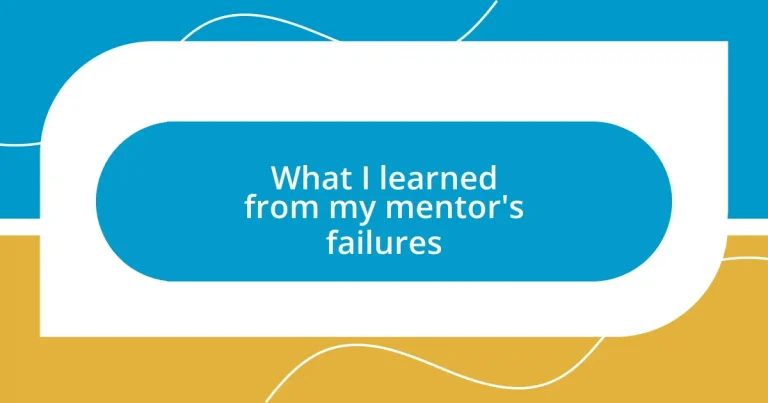Key takeaways:
- Failure is a critical aspect of growth, prompting reflection and opportunities for learning rather than being seen as a defeat.
- Key lessons from failures include the importance of adaptability, perseverance, and collaboration, emphasizing that seeking help can lead to better outcomes.
- Transforming failures into success involves reflection, gathering feedback, and cultivating resilience, which can enhance personal and professional development.
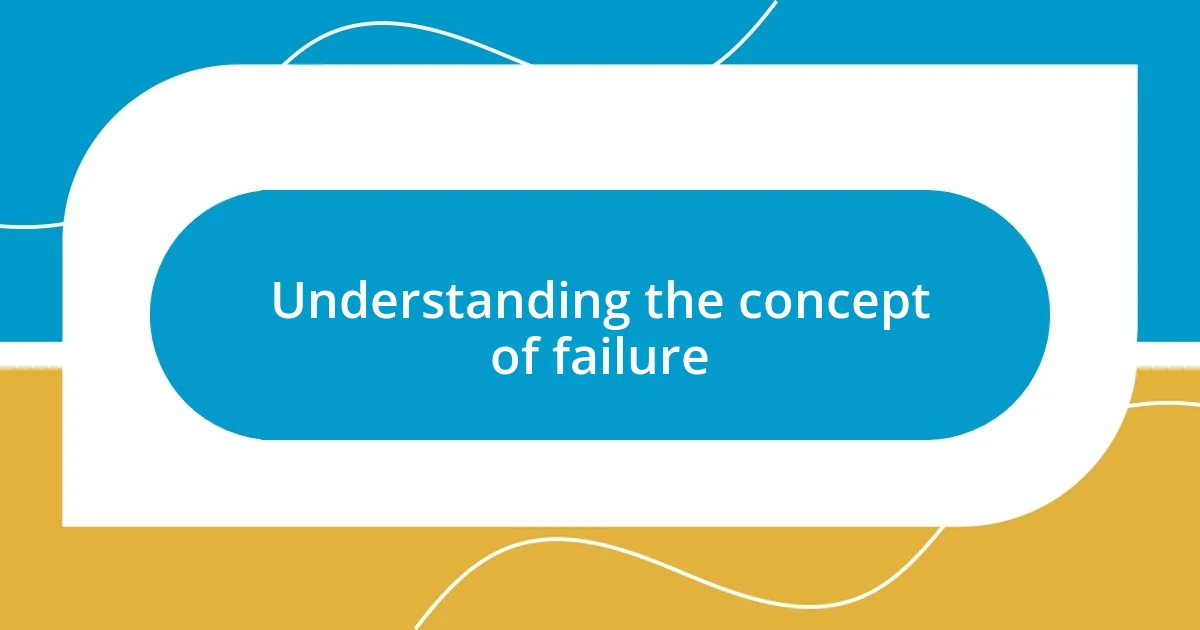
Understanding the concept of failure
Failure is often perceived as a harsh endpoint, but I’ve come to see it as a stepping stone. A few years back, I attempted to launch a project that I was incredibly passionate about. Despite my enthusiasm and hard work, it flopped. That experience taught me that failure is not a reflection of my worth, but a crucial part of growth.
When I reflect on failure, I often think about my mentor who lost a significant client, which left him feeling devastated. He shared with me how that experience forced him to reevaluate his approach and sharpen his skills. It’s in these moments of struggle that we uncover resilience; doesn’t it make you wonder how many lessons we miss when we fear falling short?
Understanding failure requires us to embrace vulnerability and be willing to take risks. I remember feeling anxious every time I put myself out there, worried about the potential for failure. But I’ve learned that these moments, though uncomfortable, pave the way for profound insights and personal transformation. It’s all about shifting our mindset—what if, instead of fearing failure, we saw it as an opportunity for learning and growth?

Lessons from my mentor’s past
When I think about the failures of my mentor, a few key lessons pop to mind. One that stands out is the importance of adaptability. He once miscalculated the market demand for a product, which led to unexpected losses. This taught me that being flexible and responsive to feedback is crucial in any endeavor. It’s imperative to pivot when situations change rather than cling to a failing strategy.
Another lesson from his past is the power of perseverance. After losing a major client, my mentor was at a crossroads. Instead of giving up, he reached out to his network and sought new opportunities. I realized that resilience plays a significant role in overcoming setbacks. There’s something truly inspiring about seeing someone face adversity head-on and come out stronger.
Lastly, I appreciate how my mentor’s experiences highlighted the value of collaboration. He once tried to handle a huge project alone and quickly became overwhelmed. This taught me that asking for help is not a sign of weakness; often, it’s a strength that leads to better outcomes. It’s a reminder to lean on others and foster relationships that can carry us through tough times.
| Mentor’s Failure | Key Lesson |
|---|---|
| Misjudged market demand | Importance of adaptability |
| Lost a major client | Value of perseverance |
| Overwhelmed by project workload | Power of collaboration |
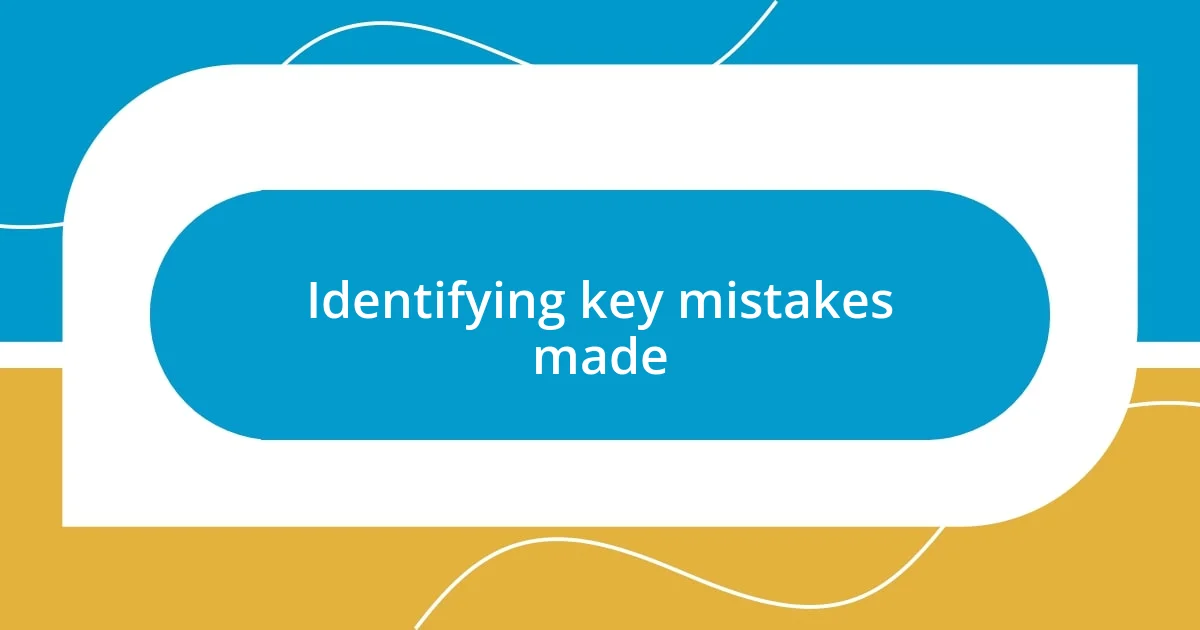
Identifying key mistakes made
Identifying key mistakes made is essential to learning from mentors’ experiences. I remember when my mentor rushed into contracts without thorough negotiation—only to realize later that the terms were heavily skewed. That moment of oversight taught me the importance of diligence. It made me realize that some mistakes stem from a lack of preparation or understanding the full scope of a situation.
Here are a few common mistakes I observed:
- Neglecting research: Not fully comprehending the landscape can lead to misguided decisions.
- Ignoring feedback: Sometimes, mentors brushed aside constructive criticism, which only exacerbated their challenges.
- Overextending resources: Attempting too much at once can dilute focus and effectiveness.
Each of these points serves as a reminder that identifying and learning from mistakes is a fundamental part of growth and development.
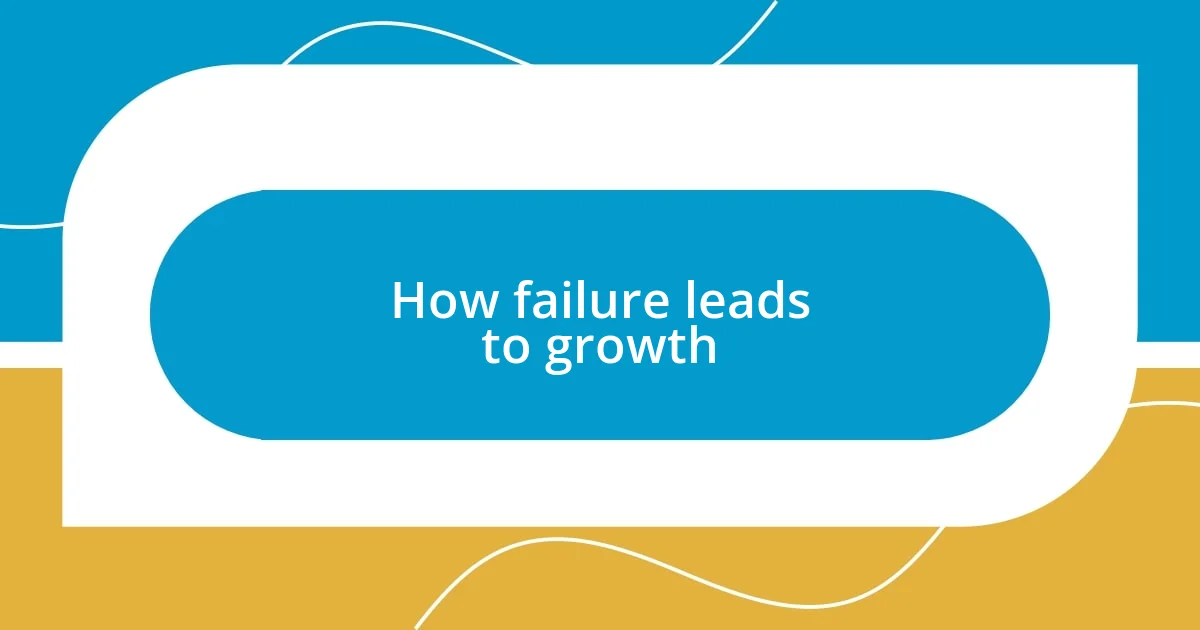
How failure leads to growth
When I reflect on my mentor’s failures, I can’t help but think of how each setback acted as a catalyst for growth. I remember a specific instance when he faced a massive setback after launching a product that failed to resonate with customers. Instead of wallowing in defeat, he took a hard look at feedback and made necessary adjustments. This taught me that failure often strips away our illusions, forcing us to confront reality and prompting growth in ways we never expected.
In my own journey, I’ve had moments where things didn’t go as planned, and I felt like giving up. But each time I pushed through the disappointment, I emerged with newfound knowledge. It’s interesting how discomfort often precedes breakthroughs, don’t you think? I learned that failure can often illuminate paths we wouldn’t have considered otherwise, revealing opportunities hidden beneath the surface.
Moreover, my mentor often emphasized that setbacks can be the greatest teachers if we choose to listen. There were times when he would gather his team, share his mistakes openly, and discuss what they could learn from the experience. This transparent approach fostered an environment where everyone felt safe to express their own failures, leading to a more resilient team. I felt a sense of camaraderie in those discussions, realizing that every misstep was a collective step toward a brighter solution. Failure, I’ve come to understand, isn’t the end—it’s a vital part of the journey toward growth.
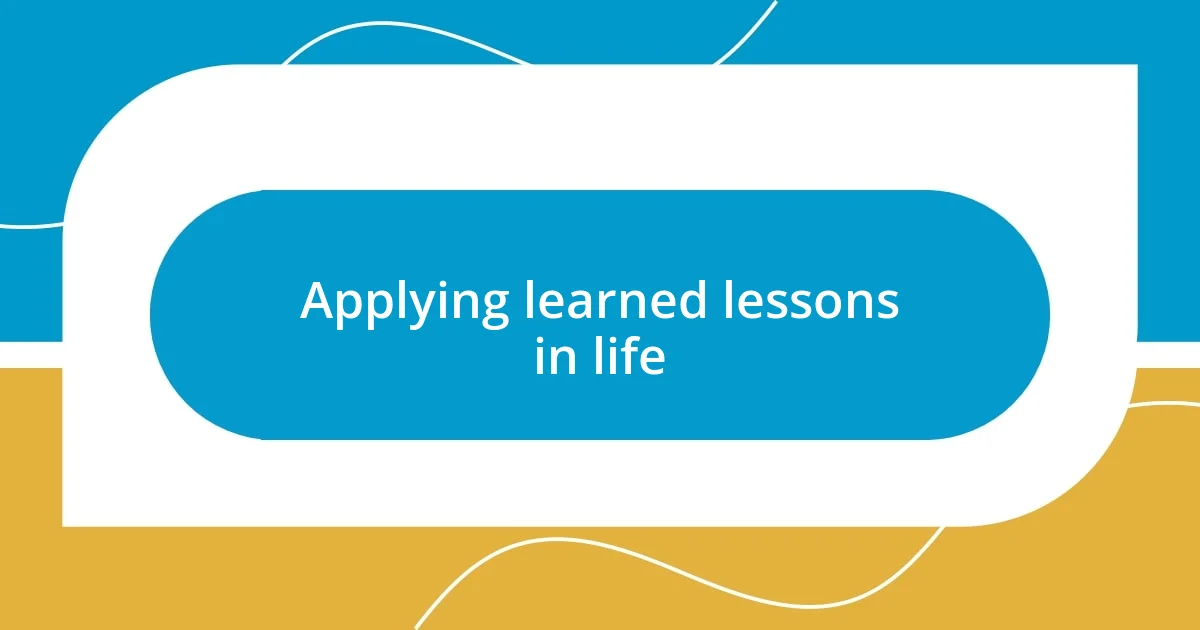
Applying learned lessons in life
When I think about applying the lessons I’ve learned from my mentors’ failures, I often relate it to my own experiences. There was a time I hesitated to launch a project because I feared it wouldn’t succeed. However, recalling my mentor’s approach to failure pushed me past that fear. By embracing the idea that failure is just a stepping stone, I ultimately found the courage to move forward, and in doing so, I discovered unexpected avenues for success.
One thing I’ve noticed is how crucial it is to actively reflect on those lessons. After one of my own missteps in a collaborative effort, I made it a point to sit down and analyze what went wrong. Instead of just moving on, I took the time to journal my thoughts and feelings about the situation. This reflection not only deepened my understanding of the failure but also illuminated ways I could adapt my strategies moving forward. It’s funny how dedicating time to reflect can turn a moment of setback into a profound learning experience, isn’t it?
Additionally, I’ve found that sharing these lessons with others amplifies their impact. During a team meeting, I recounted a project where I neglected to communicate effectively, leading to confusion. As I shared my experience, I saw nods of recognition among my peers. That moment created an environment where everyone felt empowered to discuss their own challenges, fostering a supportive community. It brought me immense satisfaction, knowing that by applying my lessons, I was not only growing myself but also helping others grow alongside me.
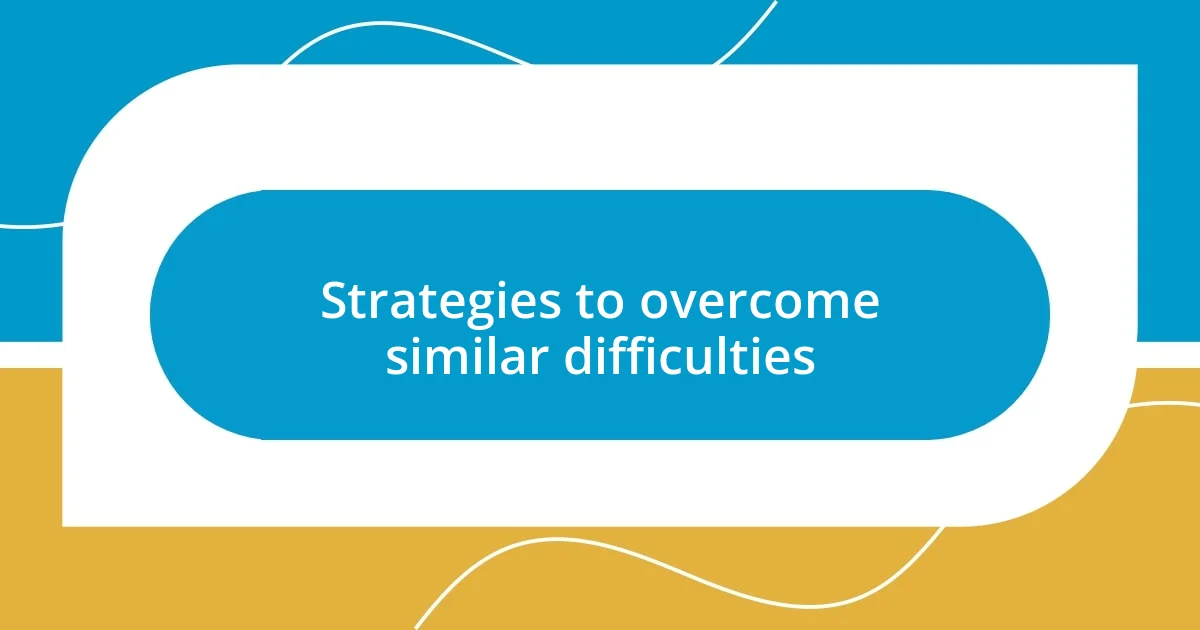
Strategies to overcome similar difficulties
When it comes to overcoming difficulties, I’ve discovered that breaking down challenges into manageable parts is essential. I recall a project that felt overwhelming due to complex moving parts. Instead of becoming paralyzed by the enormity of it, I tackled each aspect one by one. I focused on the immediate tasks at hand, which not only made it less daunting but also led to small wins that built my confidence. Does anyone else feel more empowered with smaller steps? I certainly do.
Another strategy I’ve relied on is cultivating a growth mindset. I once had a mentor who would remind me, “Every challenge is an opportunity in disguise.” That idea resonated so deeply with me. When I hit a roadblock—a term paper that didn’t come together as I envisioned—I reframed my thought process. I asked myself what I could learn from that experience rather than focusing on the negative aspects. This shift in perspective opened my eyes to new approaches and solutions. Have you ever turned a setback into a stepping stone? It can truly change everything.
Finally, I’ve learned the power of seeking feedback—something I initially avoided, fearing criticism. I remember one instance where I presented my ideas without soliciting input. After receiving lukewarm responses, I took the plunge and asked for constructive criticism from a trusted colleague. The insights I gained were exactly what I needed to refine my approach significantly. Seeking feedback can feel intimidating, but isn’t it incredible how much it can enhance our work? Embracing this practice has transformed my perspective on collaboration and personal growth.
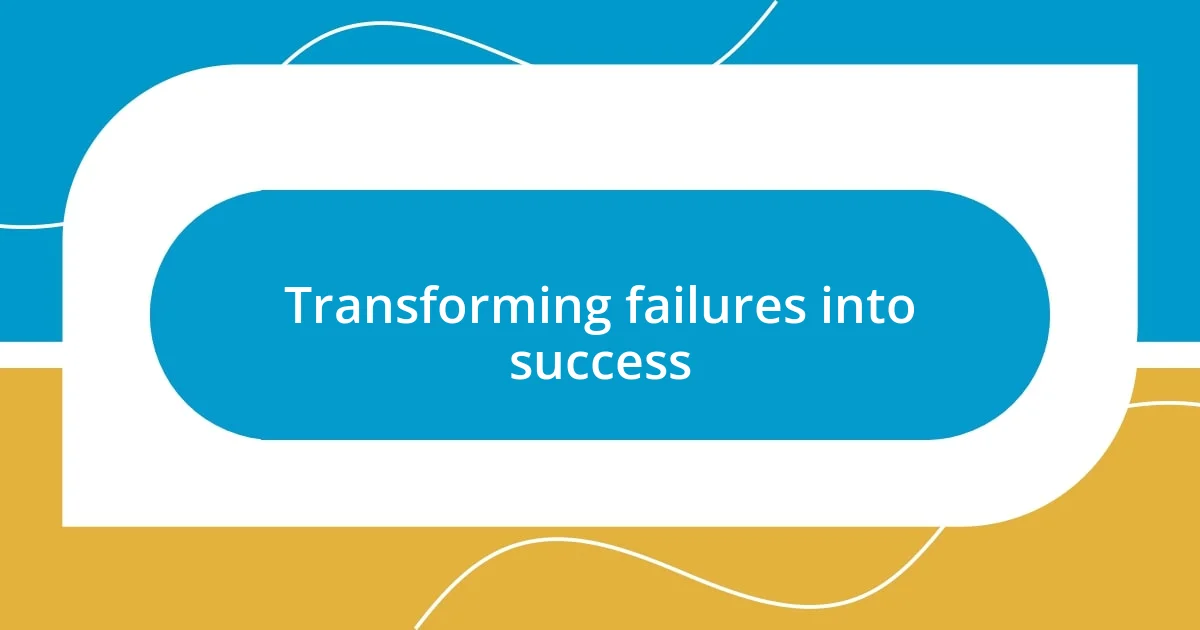
Transforming failures into success
Transforming setbacks into success is an art I’ve come to appreciate deeply. When I experienced a significant failure in a team project, I felt deflated. However, I took a step back and re-evaluated the situation. Instead of wallowing in disappointment, I found that analyzing the missteps brought clarity. It felt liberating to map out what had gone wrong and identify actionable steps for future projects. Has anyone else felt the weight lift after realizing that reflection can heal?
I also remember a time when a product I developed didn’t resonate with my audience. Initially, it stung. But then, I gathered feedback, and it was eye-opening. I discovered that I had missed the mark because I wasn’t truly listening to my customers’ needs. This experience taught me a valuable lesson: failure can become a roadmap for genuine connection. Isn’t it amazing how difficult moments can pave the way for deeper insights into what truly matters?
Moreover, I believe in the importance of resilience in this transformation process. After facing a significant setback, I leaned on personal habits that grounded me—like journaling or engaging with a mentor. These practices didn’t just help me cope; they inspired a renewed determination. As I navigated the aftermath of that experience, I realized that each failure is a chance to build my character and fortitude. Do you see your failures as opportunities for growth too? Embracing that mindset can truly reshape your journey.












